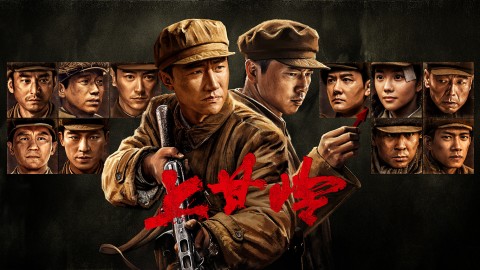Episode 36 recap: Mu Qing Wu Lan Shan devoted himself to the revolution.
Men San Dao and Wu Lan Shan waited with the unconscious Wang Di Bao for the arrival of the disciple of Prajna. When Wang Di Bao woke up, Men San Dao told him that he had imprinted the tattoo symbolizing the Dharma seal on his body. He again urged Wang Di Bao to join the revolution and together change the country.
But Wang Di Bao remained stubbornly loyal, and would rather die than join the revolution and defy the Qing court. After slitting his own throat, he fell into the sea. Finally, Men San Dao and Wu Lan Shan waited for the disciple of Prajna, and they gathered at the Huang Ji Meat Shop to unravel the mystery of the hidden treasure - the so-called four seals were actually the tattoos on the bodies of the four disciples, and when arranged in the "swirling" order, their intersections pointed to the location of the hidden treasure.
On this journey, Men San Dao and the others overcame countless difficulties, and successfully obtained the hidden treasure of the Pure Platform, which they dedicated to the revolution. The seriously wounded Wang Jialuo was no match for Mu Qing, but Mu Qing did not intend to kill him, as he still needed to obtain the seal. However, Wang Jialuo believed he did not have the seal, and Mu Qing told him that he was the seal himself.
Mu Qing tied up Wang Jialuo in the Floating Earth Temple, and then left with Wu Lan Shan to bid farewell to Liu Lin. Wu Lan Shan told Liu Lin to rest assured, as when she returned, the country would be better than she imagined, and it would be strong by then. After cremating and burying Liu Lin, Wu Lan Shan took Mu Qing and left the Floating Earth Temple, planning to go to the North China headquarters to send a telegram, while Mu Qing had something else to take care of.
Previously, Lin Hao Han had given Wu Lan Shan a telegram address, instructing her that if anything happened to him, she should send a telegram to Hong Kong, so that his master would know how to act. Now Wu Lan Shan has come to the North China headquarters to fulfill Lin Hao Han's request.
Mu Qing alone stormed the Japanese garrison, using their own weapons to kill Nogami Kan and Seiko Nobuyoshi to avenge Lin Hao Han. Prince Qi and the Internal Affairs Office troops arrived at the North China headquarters, but the North China Army had temporarily changed their mind about supporting Prince Qi's coup. Prince Qi realized that Zhong Haichao had ultimately chosen the North China Army. Over the years, Prince Qi had pushed Zhong Haichao into a position of real power, and now Zhong Haichao had betrayed him.
Zhong Haichao believed that Prince Qi had chosen him as a son-in-law because of his intelligence and abilities, but a truly capable person would not be content with being controlled. All these years, Prince Qi had been wary of him, making him and the North China Army feel hopeless. Zhong Haichao believed that the Qing dynasty had become rigid and decadent, which is why it was bullied by many powers. This angered Prince Qi, who ordered Zhong Haichao to be executed immediately.
Prince Qi originally intended to kill Haitang as well, but Wu Lan Shan's appearance made Prince Qi spare Haitang, hoping that Haitang could witness the future of the world. Wu Lan Shan told Prince Qi that she hated him not because he forced her to marry someone she did not love, but because her father had clearly forced her, but still put on a pretense of doing it for her own good.
And all this was not for her own good, but for his own desires. Prince Qi knew that his daughter still had feelings for Mu Qing, and now he agreed to Mu Qing and Wu Lan Shan's marriage, but Wu Lan Shan said that their marriage in the future did not need Prince Qi's approval. Mu Qing and Wu Lan Shan, along with the unconscious Wang Jialuo, waited for the arrival of the disciples of Bodhidharma. When Wang Jialuo woke up, he found himself on a boat, and Mu Qing told him that the Bodhidharma seal had actually been on Wang Jialuo all along, in the form of the tattoo on his back.
Later, the senior brother of the Luohan Hall brought the disciples of the Bodhidharma Hall, and Mu Qing told Wang Jialuo that the tattoo on his body had already been imprinted, and persuaded Wang Jialuo to join the revolution to change the country, but Wang Jialuo remained stubbornly loyal, and chose to die rather than join the revolution and defy the Qing dynasty, throwing himself into the sea. Mu Qing and Wu Lan Shan gathered the four parts of the seal, and Lin Hao Han had previously told Wu Lan Shan the method of deciphering the seal. They put the four tattoos together, analyzed the pattern inside, and arranged the locations in sequence, and the intersection point was the location of the hidden treasure.
Afterwards, Mu Qing took the disciples of the Luohan Hall to the location according to the map and successfully obtained the hidden treasure, which they then contributed to the revolution. Mu Qing and Wu Lan Shan erected a nameless monument for those who had died in the search for the hidden treasure of the Jingtan. Afterwards, Wu Lan Shan planned to go to Hong Kong first, as Lin Hao Han's brothers were now transporting the treasures in the hidden cache, and she was responsible for supervising the counting.
Wu Lan Shan told Mu Qing to go to Wuchang first, and they promised to meet again in Wuchang. On December 30, 1911, Wu Lan Shan called Mu Qing in Hong Kong, and now the Wuchang Uprising had succeeded. Mu Qing said that this was just the beginning, and he hoped that more people would come to change the world, and he was willing to believe that everyone could move forward. Now he saw hope in changing the world, and he also saw hope in marrying Wu Lan Shan.
The two promised to meet again, and they hastily threw themselves into the revolution. On August 29, 1913, Mu Qing was killed in the Second Revolution in Nanjing. On October 10, 1926, Wu Lan Shan was hit by stray bullets during the final assault on Wuchang by the Fourth Army of the Northern Expedition, and died a year later in Guangzhou. After parting in Fujian, they never saw each other again in this life.



Comments(Episode 36)